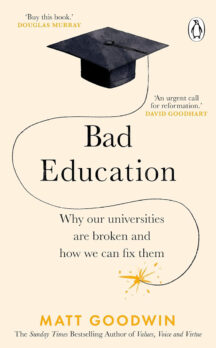Publisher
Bantam
ISBN 10
1787635244
Published
6 Feb 2025
“Thanks to your son, I managed to get a good grade at economics A-level, and then go on to gain a first in Business Studies at uni.”
Mike (not his real name) was now working as a paramedic, where he’d found his metier. He was speaking to my mother as we waited in the queue in hospital to buy a cup of tea.
It was a great source of pride to me, getting hundreds of students through their A levels and encouraging them to go to university. But for some time I have asked myself a question: would I recommend this route now?
For a start, as Tom Calver has pointed out in the Sunday Times, the difference between the average pay of graduates and non-graduates is declining. Factor in the debt incurred, combined with a depressingly high rate of interest, and the financial attraction of university palls somewhat.
One could argue that university nevertheless provides a wonderful opportunity to be exposed to alternative viewpoints, have access to the latest cutting edge research and enjoy the cut and thrust of debate.
However, these benefits are increasingly called into question by recent controversies surrounding universities.
For example, while I was reading this book, Sussex university was fined over half a million pounds for the way a gender-critical professor, Kathleen Stock, was effectively silenced. Meanwhile, over in the USA, Columbia University has had $400 million of funding withdrawn because of antisemitism on campus.
One has the impression that the main role of the university these days is to maximise profit, while that of the majority of teaching staff is to ensure the ‘correct’ views are passed on to students. All the while, students’ main concern seems to be to seek protection from anything that might make them feel unsafe.
The implications for the school curriculum and accountability are potentially huge
This is where Matt Goodwin’s book comes in. Goodwin himself is often characterised as ‘right-wing’, reflecting his strong support for Brexit, controlled immigration and free speech advocacy. Bad Education is his detailed account of the state of the latter on British campuses today.
The book draws attention to the fact that because of universities’ reliance on funding from sometimes dubious sources, they may sometimes behave in a hypocritical manner.
He also points out that while universities are rightly concerned with addressing diversity in terms of ethnicity and gender, the same cannot be said about diversity of opinion.
Indeed, expressing the ‘wrong’ opinion can get you ostracised and subjected to disciplinary procedures if you are a student, while lecturers face very real consequences to their careers for proposing to undertake the ‘wrong’ kind of research.
So what is to be done? Goodwin proposes government intervention, and therefore supports the Higher Education (Freedom of Speech) Act passed by the last government and rues Labour’s work to water it down, ostensibly to protect students from emotional harm.
Beyond that, Goodwin has nothing to say about how education policy more broadly or educators themselves might deal with the situation.
Perhaps the lesson for school leaders is to keep teaching young people to think and consume critically for themselves, and to help them navigate the fine line between expressing robust opinion and offending others.
And perhaps the recent increase in policy attention on the 50 per cent who don’t go to university by raising the status of vocational education is part of the solution too.
Goodwin doesn’t say. The book is thoroughly researched and extends beyond mere polemic; however, its arguments often feel one-sided, and more about raising concerns than solving them.
Nevertheless, Bad Education is an important contribution to a very live debate. Sadly, without solutions schools can implement, this debate can only result in more and more people questioning whether today’s universities continue to offer the transformative opportunities they did for a generation of Mikes.
The value of this book is that it requires us to examine such questions. Their implications for the school curriculum and accountability are potentially huge.
But while Goodwin benefits from writing this as an ex-insider, he is hindered by the very perspective that motivates him.













Your thoughts